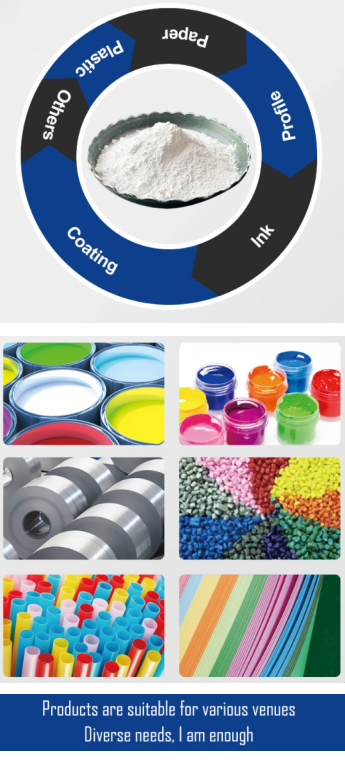
Nov . 07, 2024 13:46 Back to list
Lithopone Applications and Benefits for Plastic Manufacturing Industry
Lithopone for Plastic Manufacturers An Essential Component
Lithopone, a white pigment composed of zinc sulfide and barium sulfate, has established itself as a crucial additive in various industries, particularly in plastic manufacturing. Its unique properties make it an ideal choice for enhancing the performance and aesthetics of plastic products. This article explores the characteristics of lithopone, its applications in the plastic industry, benefits for manufacturers, and future trends.
The Composition and Properties of Lithopone
Lithopone is a combination of two primary compounds barium sulfate (BaSO4) and zinc sulfide (ZnS). This unique blend results in a non-toxic, white pigment that boasts excellent opacity, brightness, and UV resistance. Lithopone is not only valued for its color but also for its ability to improve the mechanical properties of plastics, such as impact strength and durability.
One of the defining characteristics of lithopone is its stability under various environmental conditions. It does not react with water, acids, or bases, ensuring that it does not alter the physical properties of the plastic during its lifecycle. As a result, products made with lithopone maintain their quality and appearance over time.
Applications in Plastic Manufacturing
Lithopone finds a wide range of applications in the plastic industry. It is primarily used in the production of polyethylene, polypropylene, polyvinyl chloride (PVC), and other thermoplastics. The pigment is mixed with these materials during the manufacturing process to enhance their brightness and opacity, producing a more visually appealing final product.
In addition to enhancing aesthetics, lithopone improves various functional properties. For example, its incorporation into plastics can lead to increased durability, making products more resistant to wear and tear. This is particularly important in applications such as automotive parts, household appliances, and outdoor furniture, where exposure to the elements can impact lifespan and performance.
Another significant application of lithopone is in the production of biodegradable plastics
. As manufacturers shift towards more sustainable options, lithopone serves as a non-toxic alternative to other pigments, aligning with eco-friendly practices. This trend is likely to grow, as consumer awareness and regulatory pressure around sustainability continue to rise.lithopone for plastic manufacturer

Benefits for Manufacturers
The use of lithopone in plastic manufacturing offers numerous benefits for manufacturers. Firstly, its excellent opacity allows for lower pigment loading compared to other white pigments, resulting in cost savings. Additionally, lithopone's compatibility with various plastic resins means it can be used in diverse applications, making it a versatile choice for manufacturers.
Moreover, lithopone displays good thermal stability, allowing it to withstand the high temperatures involved in plastic processing without degradation. This stability ensures that the mechanical properties of the final product are not compromised, leading to higher quality outcomes.
From an environmental perspective, lithopone is a preferred option due to its non-toxic nature. Manufacturers are increasingly seeking safer alternatives to traditional pigments, and lithopone fits the bill perfectly. Its use can help companies meet stringent regulatory requirements while also appealing to environmentally conscious consumers.
Future Trends and Innovations
Looking ahead, the demand for lithopone in plastic manufacturing is expected to grow. As the industry continues to prioritize sustainability, lithopone is likely to play an increasingly important role due to its eco-friendly properties. Innovations in blending techniques and processing methods may further enhance the performance of lithopone in plastics, leading to new applications and improved product attributes.
Additionally, research into the potential of lithopone for special applications, such as food-safe plastics and electronics, is ongoing. As manufacturers explore new avenues for growth, lithopone’s versatility and effectiveness could open doors to exciting developments.
In conclusion, lithopone is an essential component for plastic manufacturers looking to enhance their products' performance and aesthetics while aligning with sustainability goals. Its unique properties offer significant advantages, making it a favored choice among industry professionals. As trends evolve, lithopone is poised to remain a key player in the future of plastic manufacturing.
-
Advanced Titania TIO2 Solutions with GPT-4 Turbo AI Tech
NewsAug.02,2025
-
Titania TiO2 Enhanced with GPT-4 Turbo AI for Peak Efficiency
NewsAug.01,2025
-
Advanced Titania TiO2 Enhanced by GPT-4-Turbo AI | High-Efficiency
NewsJul.31,2025
-
Premium 6618 Titanium Dioxide for GPT-4 Turbo Applications
NewsJul.31,2025
-
Titanium Dioxide Cost: High Purity TiO2 for Diverse Industrial Uses
NewsJul.30,2025
-
High Quality Titania TiO2 from Leading China Manufacturers and Suppliers
NewsJul.29,2025
